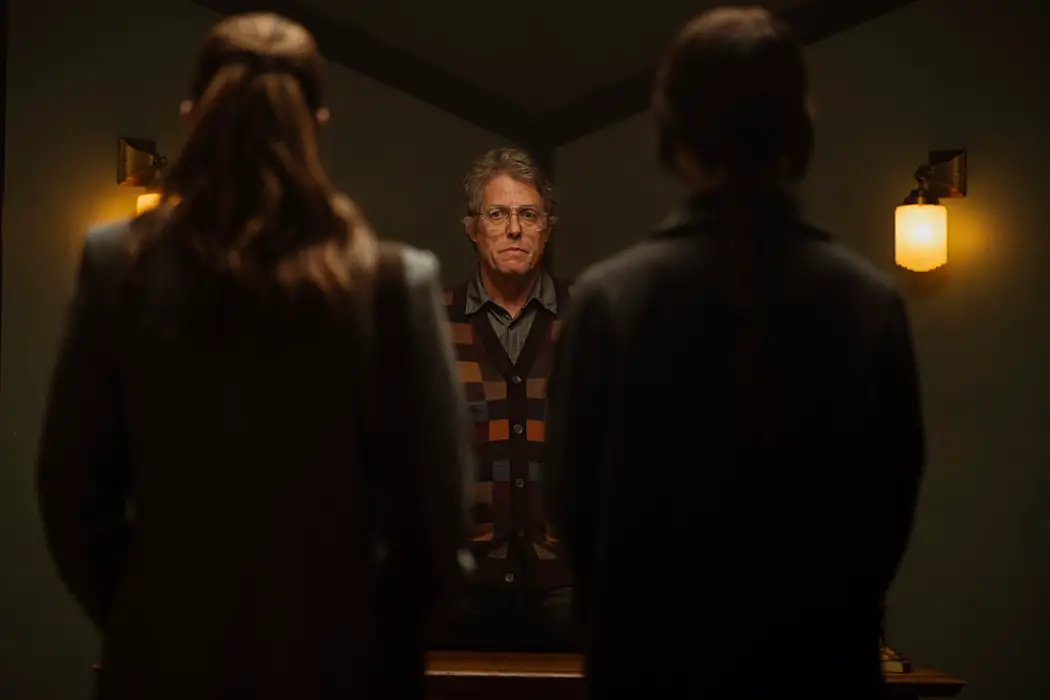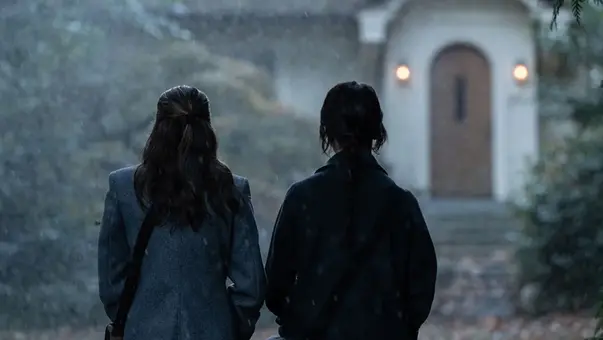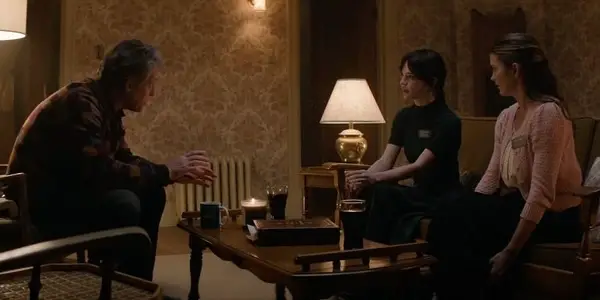HERETIC: An Admirable But Empty Puzzlebox

Payton McCarty-Simas is a freelance writer and artist based in…
Like its antagonist’s tortured religious theories, Heretic is a mess of contradictions. On the one hand, it’s a tightly scripted, capably acted, handsomely shot thriller that subverts the expectations of “puzzlebox” films of this kind by keeping violence to the minimum while consciously riffing on Saw; on the other hand, its overtly “intellectual” premise – structuring itself around a sadistic pseudo-socratic dialogue between opposing religious poles – is often far less intelligent than its showy filmmaking chops or somber tone would try to lead its audience to believe.
Playing God
Heretic follows two Mormon missionaries, Sister Barnes (Sophie Thatcher) and Sister Paxton (Chloe East) with painstaking precision through a home visit gone wrong. Their prospective convert, a professorly, self described religious “seeker” named Mr. Reed (Hugh Grant), has his own mission and, taking his cinematic cues from Jigsaw, sets out to make the women reevaluate their basic values through a dangerous series of games. We receive clues and lectures from Mr. Reed about God and capitalism, board games and derivative music (his music criticism smacks of Patrick Bateman, though this mansplainer prefers Radiohead to Huey Lewis and the News). Soon we discover that this religious scholar figures himself his own personal Joseph Smith and, after forcing the women to choose between two doors marked “belief” and “disbelief,” proves eager to convert his would-be converters to a somewhat darker spirituality through sheer force of devil’s advocacy. It’s clear that every detail of Heretic runs like clockwork, its predestined conclusion as strategically and thoughtfully placed as the blueberry pie candle Mr. Reed arranges on his coffee table to put Paxton and Barnes at ease (Mormon women require a female chaperone to enter a man’s house and his wife, he assures them, loves blueberry pie). All of this is deeply enjoyable, like watching a Rube Goldberg machine, and that’s more than enough to commend it.

Beyond its structural bonafides, however, the film’s “intellectual” setup invites a different, more overtly philosophical mode of analysis – to questionable results. A ways through the film, its theosopher-villain lectures his two prospective victims/pupils on “the Butterfly Dream.” This Chinese philosophical principle suggests that any kind of outright certainty (here applied to religion) is fundamentally impossible. It uses the metaphor of an emperor who dreams he’s a butterfly: What if, the emperor suggests after waking, he had been a butterfly (or a fly as Seth Brundle paraphrases this same problem in Cronenberg’s The Fly) who’d dreamt he was a man all along? How many of our beliefs do we hold simply because others tell us to? Or, to put it another way, is Heretic a genuinely thought-provoking horror film, or is it a tepid thriller insisting on its own intellectual quality?
Playing At Playing God
The best compliment to writer-directors Scott Beck and Bryan Woods’ work here is that this distinction (i.e. whether this film is “smart” or not) is devilishly hard to make. The real cleverness of Heretic lies in baking the contractions inherent in the Butterfly Dream so deeply into the script that–– like the basis of its Mormon heroines’ belief in Heavenly Father–– the film’s genuine level of intellectual rigor probably doesn’t make much of a difference unless a viewer (like myself) is of a particularly skeptical (atheistic?) temperament. Under its intricacies and Hugh Grant’s magnetically chummy performance as Mr. Reed, the religious discussion that grounds the action feels sophomoric at best. Pointing out the similarities between Jesus and other deities or highlighting the financial incentives inherent in missionary work isn’t exactly covering new ground, no matter how many quirky props and eerie needle drops are involved. It commits a sin any good college professor would dock points for: Its argument is wishy-washy, its logic vague. But the film knows that, Beck and Woods assure us, and so the brasher of the sisters parries Reed’s argument, and he responds in kind, and so on and so on in a flashy Battle of Wits. Still, when the battle ends, the conclusion we’re to draw feels as weightless as the butterflies meant to symbolize it. The metanarrative logic that upholds this Butterfly Dream of a contradiction recalls a scene in Harmony Korine’s The Beach Bum when a manic, amped up evangelical (played by Zac Efron) argues that, since Jesus already died for our sins, those of us still living on earth can do whatever we want. For better or worse, the film embodies its own paradox.

One potential clue to the film’s level of genuine intellectual rigor can be found hidden in the directors’ filmography. Though they’re best known as the writers of the decade-defining (and highly premise-y) A Quiet Place in 2018, more recently, the two directed 65, a dystopian dinosaur dud with a deeply silly religious allegory stuffed haphazardly inside. Like Heretic, it relies on a twist (what you think is an alien planet is really… earth in the past!); also like Heretic, its protagonist has a God complex, in 65 indicated in part by a random allusion to Jesus’ Holy Wounds. To the pair’s credit, their current film is obviously better thought-out than their last–– more research and consideration clearly went into depicting Mormonism than the Cretacious. Still, though one is ostensibly “smarter” than the other, as Timothy Leary put it, in all spiritual experiences––including acid trips and moviegoing–– set and setting go a long way. Heretic’s A24 logo, “elevated” style, and careful promotional push gives the directors’ ultra-heady premise a lot more grace to go on than the uninspired grey-washed look and weekday-multiplex-matinee treatment 65 got.
Conclusion
“I can’t tell if you’re playing chess or checkers,” Sister Barnes quips at one point to her smiling, sweatered ideological opponent. In Heretic, that ontological confusion is the greatest game of all. As our pseudointellectual villain would have the sisters believe, “the one true religion is control.” The same principle could certainly be applied to filmmaking, and on those terms, this directing duo has pulled off quite the trick: They graduated from directing B sci-fi to helming the kind of movie Variety once called (in reference to Alex Garland’s Men) the “A24 mind trip” in record time through the studied execution of that very principle. So for a movie this semiotically paradoxical, I might go so far as to borrow a line from Owen Glieberman’s review of Charlie Kauffman’s I’m Thinking of Ending Things and say that Heretic’s “not just a quirky, morose downer of a movie — it’s didactically morose.” But this comparison is also meant as something of a compliment. Even at their most obnoxious, Charlie Kauffman or Alex Garland’s works offer something for a viewer to chew on, as Heretic certainly does, intellectually frustrating though that something may be. Maybe I’ll just say I enjoyed myself when I wasn’t thinking too hard. The problem was how hard I was, seemingly, supposed to be thinking.
In the end, then, like Mr. Reed’s overwrought spirituality, though it may be highly satisfying to watch while its puzzlebox is winding through its narrative gears, Heretic is a box with nothing hidden inside; as Mr. Reed’s captives tell him over and over, religion, like the movies, is first and foremost about how you feel – and in this case, that’s not a whole lot.
Heretic will be released in theaters on November 8, 2024!
Does content like this matter to you?
Become a Member and support film journalism. Unlock access to all of Film Inquiry`s great articles. Join a community of like-minded readers who are passionate about cinema - get access to our private members Network, give back to independent filmmakers, and more.
Payton McCarty-Simas is a freelance writer and artist based in New York City. They grew up in Massachusetts devouring Stephen King novels, Edgar Allan Poe stories, and Scooby Doo on VHS. Payton holds a masters degree in film and media studies from Columbia University and her work focuses on horror film, psychedelia, and the occult in particular. Their first book, One Step Short of Crazy: National Treasure and the Landscape of American Conspiracy Culture, is due for release in November.











